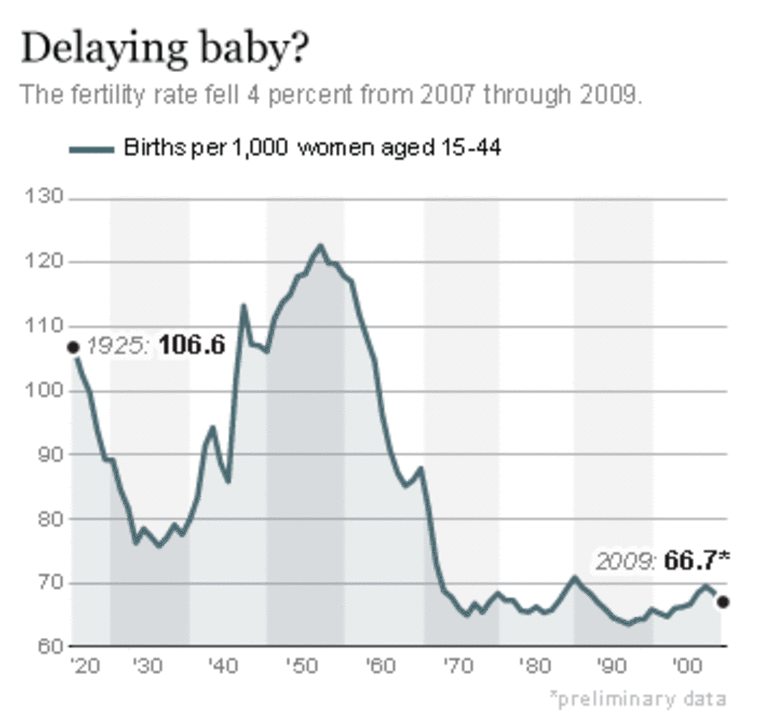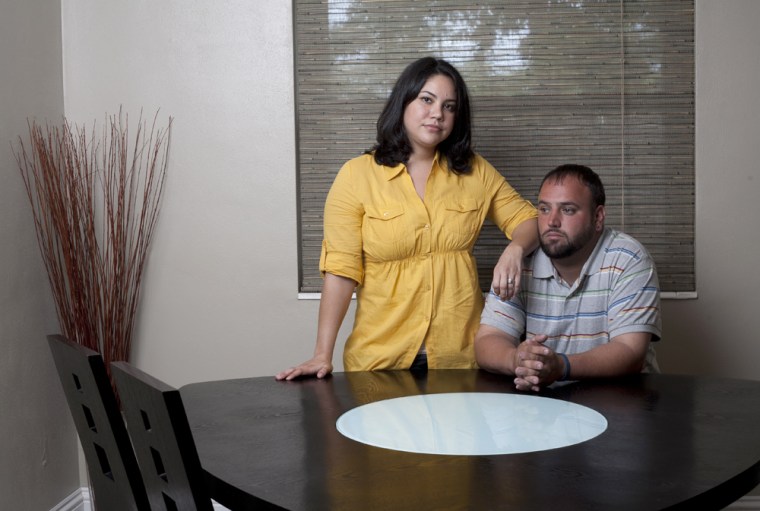Until recently, Diana Lorenzo wasn’t sure she wanted kids.
Now she is sure, but the 32-year-old small-business owner wonders whether she and her husband can afford it.
“We’re hurting, financially,” she said. “We’ve streamlined everything, and that’s why I can’t imagine. Where can I cut?”
The U.S. fertility rate fell 4 percent from 2007 to 2009 — the biggest drop in more than 30 years, according to the federal Centers for Disease Control. Those years coincided with the worst recession in at least 30 years. The CDC cautions that there is not enough data to prove cause and effect, but independent researchers do see a trend.
And many women told msnbc.com anecdotally that the economy has played a major role in their decision not to have a baby right now.
For Lorenzo, just getting pregnant would bring financial worries. Both she and her husband run their own businesses — she has a media buying firm and he’s a mechanic — and both have struggled through the economic doldrums of the past few years.
Now things are starting to improve, and Lorenzo thinks having her own business is an asset because it will give her some flexibility with a child. But she recently learned that just adding maternity coverage would cost about $400 more a month in health insurance, pushing the monthly premium over $1,000.
That’s even before she starts to factor in the costs of insuring and raising a child. As the middle child of five, Lorenzo said she watched her parents work two jobs and occasionally skip meals to pay their children’s expenses.
“I don’t want to be in that position,” she said.
For other parents, the financial strain of raising one child leaves no budget for another.
Frances Claxton, 28, loves her siblings and always figured she’d have two kids.
Then she lost her job shortly before becoming pregnant with her son, Andrew, now 2, and she and her husband moved to Gladewater, Texas, from Oregon because he got a promotion. She hasn’t been able to find a new job, and the couple is grappling with medical bills because their son was born with a cleft lip that has required multiple surgeries.
“When I think about how Andrew’s growing up so fast it does really make me long to have a baby again. They really are only a baby for a short period of time,” Claxton said. “But (it) immediately goes back to, well, we can’t afford one, so I’ve got to forget about it. I’m lucky that I got to have one.”
Researchers say there is growing evidence that Claxton and Lorenzo are part of a trend.
“We clearly saw a strong association between the change in economic indicators and the change in fertility,” said Gretchen Livingston, a senior researcher with the Pew Research Center.
Livingston was the co-author of a report published in 2010, based on 2008 data, that showed a substantial drop in birth rates in economically hard-hit states, such as Arizona and Florida. North Dakota, which was less affected by the economic downturn, showed a slight increase in its fertility rate.

A separate survey by the Guttmacher Institute, released in the fall of 2009, found that 44 percent of women ages 18 to 34 who could get pregnant and had household incomes less than $75,000 were reducing or delaying childbearing because of the economy.
That follows a pattern of other adjustments people have made because of economic woes, said Laura Lindberg, senior research associate with the Guttmacher Institute.
“Marriage rates stalled. Migration stalled. People didn’t seem to be engaging in major life changes,” she said. “So, I think that supports the same idea: The decline in the birth rate isn’t one aberrant data point when everything else has been moving along smoothly.”
The CDC data showed the trend was most pronounced in women ages 15 to 29, and especially those 20 to 24.
Livingston, of Pew, also noted other signs of change caused by the weak economy, such as more multigenerational households and more grandparents taking on child-care responsibilities.
“To add fertility to the mix doesn’t surprise me,” she said.
Still, Lindberg said it’s too early to say whether the recent decline in fertility signals a more permanent change.
In the Great Depression, she said, it appeared many women put off having kids because of the economy and then weren’t ever able to have those children. These days women are more likely to have children later in life, both because of fertility treatments and changes in social norms.
“We have a lot more opportunity for catch-up,” Lindberg said. “The window is just bigger than it used to be.”
TODAY Moms: What's the best age to start having kids?
For now, Lorenzo — the Florida woman facing the insurance-premium increase — said she expects to delay having children for a while.
“Maybe it means I have to get more creative, and if I really want it, it will happen,” she said.
Still, the waiting is hard.
“It’s pretty devastating because it keeps me up at night,” she said.
Melissa Thompson, 30, and her husband often talk about having kids. But then something comes up — like he doesn’t get a paycheck that week — and the financial stress causes them, yet again, to put off starting a family.
In many ways, Thompson, who lives in Sherman, Texas, said this would be an ideal time for her to get pregnant. She has a steady job as a trainer for a computer software company that has good benefits and allows her to work from home.
But her husband recently decided he needs to find a new job because the family business he used to work in, installing security systems, had to downsize due to the recession. Meanwhile, he is still trying to finish college.
Thompson thinks she’ll eventually feel comfortable enough financially to have a child. But even then she expects that she'll never be as prepared as her parents were.
“I wouldn’t have been able to go to college without their help. I wouldn’t have been able to get my first car without their help, and I feel like if we’re not stable enough and we can’t provide things for our kid then that kind of makes me sad," she said.
Despite the tough times, some parents say they have gone ahead with plans to have children.
Catalina Herndon, 27, knew it would be a financial stretch when she and her husband decided to have a baby. He’s completing his Ph.D., and she works as a behavioral specialist in an elementary school in Arizona, which has been hard-hit by a state budget crisis. Together, they make less than $50,000 a year.
Still, Herndon said the couple, who live in Tucson, decided that the financial struggles would be worth it because they currently live close to their families, who can help out with child care and provide other types of support. That may not be the case later, when her husband finishes his education and they will likely have to move for his career.
“He and I both agreed that family was the most important thing,” she said.
Nevertheless, it’s a struggle. Herndon said her mother watches her 7-month-old son while she works, and the couple even plans out errands carefully to save on gas.
One day, she found herself with just $35 or $40, grappling with the fact that she needed both baby food and groceries.
“I called my mom, crying, (saying) ‘I can’t feed my family,’ ” Herndon recalled.
Mom’s advice: “That’s what the dollar menu is for.”
